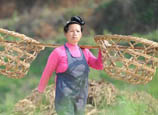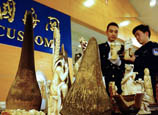
 |
| Performers practice the flower worship ceremony at Hua Zhao Festival in Fuzhou, capital of Fujian Province. |
CHINA'S first and only empress Wu Zetian (AD 625-705) loved flowers, ordered delicate cakes to be made of rice and flowers and given to her favorite ministers. She influenced the Tang Dynasty (AD 618-907) taste for floral floods and was said to love cookies with a pine flower taste.
She popularized the Flower Festival, Hua Zhao (?¨3ˉ), which falls tomorrow March 23 (the 12th day of the second lunar month). This seldom-observed fest marks the birthday of the Flower God and all the flowers. The date differs in various regions, depending on when flowers burst into bloom.
There's another famous flower legend about Empress Wu, an efficient and powerful ruler during prosperous times. Although she was influential for decades, when she finally became empress (AD 690-705), she ordered all the flowers to bloom in her garden in Chang'an (now Xi'an, capital of Shaanxi Province) to celebrate. But it was winter, against the laws of heaven, and the Fairy God was not around.
The terrified flowers, all commanded by their own fairies, all decided to bloom in winter, for fear of Wu's wrath - but not the peony, which the empress banished to Luoyang, Henan Province, where it flourishes today.
The Jade Emperor was furious and degraded all the flower fairies to mortals, where they became famous officials of Empress Wu.
Customs
People go on outings to appreciate the new blooms, and even plant their own flowers. Some tie colorful silk ribbons on flowering trees, pray in a flower temple, and eat cakes made with flowers to celebrate the Flower God's birthday.
The Hua Zhao Festival is rarely mentioned or observed, except among some minority groups in southern China.
According to mythology, the Flower God was believed to govern human procreation, so the festival is considered by some to be a form of fertility worship.
Nu Yi, a female Taoist, who was so devout that she became a fairy, was named Flower God by the Jade Emperor and governed all the flowers ever since.
Each flower has its own flower fairy who listens to the Flower God. The birthplace of the Flower God is said to be Luoyang, capital of 13 ancient Chinese dynasties.
Though the earliest record of the Flower God can be traced back to the Spring and Autumn Period (770-476 BC), the Hua Zhao Festival did not become popular in China until the reign of Empress Wu Zetian.
Another Flower Festival custom was started by a man named Cui Xuanwei who protected flower fairies in the Tang Dynasty. The legend goes that a group of beautiful women showed up in Cui's garden one night in the second lunar month and asked for his help. They told him they were flower fairies who planned to bloom but the Wind Fairy stood in their way.
Cui tied colorful silk cloth on the branches of flowering trees at wu jin (3-5am) on the next morning as the flower fairies requested. The wind howled but all the blossoms on the tree were protected and did not fall to the ground.
It has become a custom of the Flower Festival to tie silk cloths on trees, but it must be performed from 3-5am. That's why the festival is called Hua Zhao, literally meaning flower morning.
Today, most of the flower traditions have faded but some are preserved in flower markets in some regions.
Traditions
Planting flowers
It was believed that a flower planted or a plant grafted on Hua Zhao Festival would flourish better than another planted on any other day of the year.
Fluttering butterflies
Fluttering butterflies with a cloth fan is a traditional game of young Chinese women. "Group butterfly fluttering" used to be very popular.
Appreciating flowers
Contemplating flowers with close friends was popular among scholars in ancient China. They typically enhanced their floral appreciation by drinking rice wine, and then proceeded to paint or write poems about the flowers.
Praying in a flower temple
The Flower God is believed to answer prayers, just like other gods. Since she governs the growth of plants, farmers prayed for her blessing on the festival at temples. Temple fairs were common during the Flower Festival.
Eating flower cakes and wine
Sharing flower cakes and wine made from fresh flowers and fermented rice was popular in the old days.
















 How real life is, how real love is!
How real life is, how real love is!


![]()
